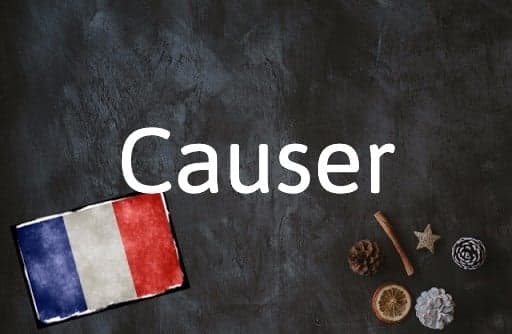French Word of the Day: Causer

This word is for those who enjoy a good chit-chat, chinwag or natter.
Why do I need to know causer?
Because it is not always what it sounds like.
What does it mean?
Causer, pronounced "cause-ey", has multiple meanings in French.
The first, most obvious meaning to English-speakers, is "to cause".
In this sense, you would use it like this.
Les grosses précipitations ont causé une inondation - Heavy rainfall caused a flood
Je ne veux pas causer des problèmes - I don't want to cause problems
But a second meaning of causer is "to chat" or "converse informally" with someone. It is a really familiar or slang way of using the word and is something you would generally say aloud rather than write down.
You can use causer in this sense like this:
J'ai causé avec mon ami en prenant un café - I chatted with my friend over a coffee
Elles ont causé pendant une heure - They chatted for an hour
Est-ce qu'on peut causer deux minutes? - Can I chat with you for two minutes?
Good to know
A nifty little expression in French is à cause de, which means because of - when you want to talk about a negative consequence of an action.
For example:
À cause de la circulation sur la route, j'ai raté mon avion - Because of traffic, I missed my plane
À cause de la pénalité, l'équipe a perdu - Because of the penalty, the team lost
If you want to say "because of" to talk about a positive or fortunate event, you should use grace à, which better translates as "thanks to".
Grace à mon bon niveau de français, je cause avec pas mal de personnes - Thanks to my good level of French, I speak with a fair number of people
Grace à ses bonnes notes, elle a pu étudié à l'université - Thanks to her good grades, she could study at university
Comments
See Also
Why do I need to know causer?
Because it is not always what it sounds like.
What does it mean?
Causer, pronounced "cause-ey", has multiple meanings in French.
The first, most obvious meaning to English-speakers, is "to cause".
In this sense, you would use it like this.
Les grosses précipitations ont causé une inondation - Heavy rainfall caused a flood
Je ne veux pas causer des problèmes - I don't want to cause problems
But a second meaning of causer is "to chat" or "converse informally" with someone. It is a really familiar or slang way of using the word and is something you would generally say aloud rather than write down.
You can use causer in this sense like this:
J'ai causé avec mon ami en prenant un café - I chatted with my friend over a coffee
Elles ont causé pendant une heure - They chatted for an hour
Est-ce qu'on peut causer deux minutes? - Can I chat with you for two minutes?
Good to know
A nifty little expression in French is à cause de, which means because of - when you want to talk about a negative consequence of an action.
For example:
À cause de la circulation sur la route, j'ai raté mon avion - Because of traffic, I missed my plane
À cause de la pénalité, l'équipe a perdu - Because of the penalty, the team lost
If you want to say "because of" to talk about a positive or fortunate event, you should use grace à, which better translates as "thanks to".
Grace à mon bon niveau de français, je cause avec pas mal de personnes - Thanks to my good level of French, I speak with a fair number of people
Grace à ses bonnes notes, elle a pu étudié à l'université - Thanks to her good grades, she could study at university
Join the conversation in our comments section below. Share your own views and experience and if you have a question or suggestion for our journalists then email us at [email protected].
Please keep comments civil, constructive and on topic – and make sure to read our terms of use before getting involved.
Please log in here to leave a comment.